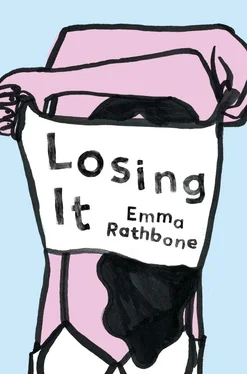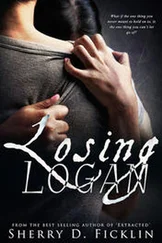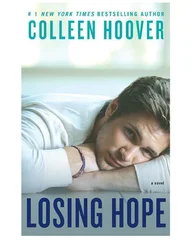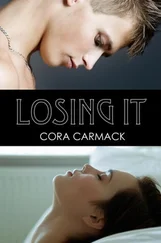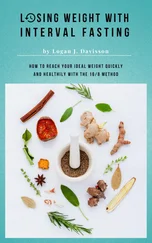“I spoke to my dad,” I said. I put my hand in my wet armpit and looked out the window. “He sounded, I don’t know, it’s hard to explain. Different. Like there was this slant to his voice I’d never heard before. It’s like I could finally see him, the way anyone else would. He’s a charming, slightly wayward man.”
“It is weird when you can see your parents from the outside like that.”
“Yeah.”
“What about your mom?”
“I don’t know,” I said. I walked over to the bureau and looked in the decorative pitcher. There was dust and a dead bug. “She’s rewriting the story,” I said. “She says now they were never content, but I remember, they were happy.”
“But you can never know.”
“No.”
My whole childhood — me playing in the backyard, my parents hard at work on their computers in their messy office, the supplies closet I’d open sometimes, because I liked the smell of new plastic folders and erasers, and I’d waver there, sucking it in. I saw us all from the outside — our house in our flat neighborhood, but I saw it on an incline, a slant, so that we were sliding, ever so slightly, so that we couldn’t even tell until we were flying off the edge of the earth.
“What are they going to do?” said Grace.
“My dad’s going to stay with some friends in Miami for a while, and my mom is going to take care of things with their business. They’re thinking of selling it now. She’s in a different mood every time I talk to her. I can’t tell if this breakup is a new thing, or if there was something there from the beginning. A thread.”
“Things change,” said Grace. “Everything changes. Everything sloughs itself off, renewing the surface, until there’s nothing there from before.”
We were quiet for a few moments.
“Can I tell you something?” said Grace.
I always pictured Grace the same way, the way I remembered her from college — with a faint mustache, and her brown hair slicing along her shoulders, and her face tilted in reflection at a soapstone sculpture at the university museum.
“Yes.”
“My whole life — I’ve never told anyone this — my whole life, all the men I know, my dad, my brothers, Chad, everyone, I’ve always felt sorry for them. From the get-go. Even when I was a kid. Just a kind of ancient, inherent sadness for them.”
“Yeah,” I sighed. “I kind of know what you mean.”
I sat on the edge of the bed and then lay back, stretching my body so my legs hung off like dead weight.
“I don’t know,” I said. “It still doesn’t make sense to me. Maybe one of them is having an affair or something.”
My parents and Jack. Two suppurating questions, hanging in the air. Two things that would never be solved.
“Or maybe they really did just drift apart. Maybe it’s that simple. Things usually are.”
“No, they’re not,” I said. “They’re usually really, really complicated.”
—
Viv was at the kitchen table, wearing a blouse with a pattern of palm leaves on it. She was poring over her little leather notebook and also had some large pieces of paper spread out in front of her. It struck me how her weekend or casual clothes all looked like they were bought from a gift shop in Key West. Her hair was carefully parted and resting behind her shoulders.
After getting off the phone with Grace, I’d wandered down, determined to distract myself.
I went over to a cabinet and rummaged around until I found a small tub of beef jerky. I yanked the top off and withdrew a piece and then turned around to face Viv.
“I like your shirt,” I said, chewing.
“Thanks,” she said in a distracted way.
“It’s really relaxed.”
She looked down at it.
“It’s like”—I hoisted myself up onto the counter—“beach time!”
“Yes,” Viv said, and jotted something down.
“I’d like to go to the beach,” I said. “I haven’t been in years. Not since I lived in Texas. The last time I went, there was a wedding, and the wind blew away a bunch of linen bows…”
She was in the middle of a project. There were lots of pieces of paper arranged in front of her, and it looked like she was making some kind of graph in her notebook.
“What are you doing?” I said.
She put her pencil down and looked at me directly. Then she sighed and sat back. “I’m trying to map out my show,” she said. “But I’m having a hard time with it.”
“Why?”
“Well, I don’t have a lot of space. Everyone gets a certain allotted wall space.” She tapped her chin with her pencil. “And I’m not sure what pieces to use.”
“Well, they’re all really good,” I said unhelpfully.
“Thanks,” she said uneasily.
“I’ll need your help,” she said, “if you don’t mind. I’ll need help getting the plates to the center, because I’m going to have to pick up some things after work, and I won’t have time to do both.”
“Sure, yeah,” I said, and nodded. And I kept nodding, as she told me what I was going to have to do, and how it was all going to work, but all I could think of was my e-mail. And how I wanted to check it. And of Jack, and all the things he did — like how he’d taken that bottle of wine out of the cooler and sort of tossed it up and caught it again. So confident. So at home with things. And that’s how it would be with me. He’d manhandle me in an affectionate way all the time. He’d toss my hand up when we walked down the street, and I would be included in the easy, confident way he had of owning everything that was around him. Everything would be ours if we were together.
“But it shouldn’t be too hard,” Viv was saying, “because I’ll have all the crates packed up and ready to go, waiting for you in the living room.”
“Sounds good,” I said.
But when I thought about my e-mail I got this doomed feeling. I put down the tub of jerky and stared out the window above the sink. The day was thick and humid, and outside was an anguish of lush greenery.
“It’ll be great,” I said.
I felt hot, claustrophobic, deranged. I kneaded my palm.
“Yes,” said Viv. She anxiously turned her watch around and around on her wrist. “Yes.”
When I saw Jack standing next to the wide plastic leaf of a fake palm tree, I realized he was one of those people who looked a little different every time you saw them. This time his face looked almost pretty — strewn blue eyes, ruby lips.
I had finally, finally gotten an e-mail from him, four days after I’d written, asking if I wanted to meet him at the restaurant where he worked, a place called the Lazy Parrot out on Route 29, at five o’clock that same evening. It was the day of Viv’s art show. The reception was from seven until nine thirty, and I was supposed to ferry the plates over there after work. She’d wrapped them up carefully and they were waiting for me in the living room. I decided I’d go and get them first, then go and meet Jack, and go from there to the McCormick Center, arriving at six o’clock. Viv would be setting up the platters of hors d’oeuvres she’d taken it upon herself to provide. Then we’d hang up the plates together. I would have plenty of time.
Back at home, after leaving work early, I quickly shoved aside the maps and jumper cables and old books that were in my trunk to make room. I carried the crates that were waiting for me in the living room down the porch steps and then hoisted them into the car. My hair got in my face. My armpits were prickling. I checked my watch.
I got in and drove off only to sit in unexpected traffic for fifteen minutes. I stared at the shimmering tar roof of a pancake restaurant. By the time I got to where Jack was, I would only have about half an hour before I would have to leave to get to the center in time. Maybe I could be a little late. Viv had, in my opinion, overestimated the time it would take to put up the plates anyway.
Читать дальше
Конец ознакомительного отрывка
Купить книгу
